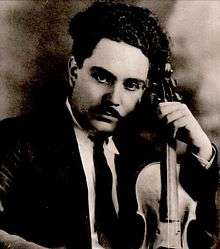String Quartet No. 2 (Revueltas)

String Quartet No. 2 (Magueyes) is a chamber-music work by the Mexican composer and violinist Silvestre Revueltas from 1931. The score is dedicated to Aurora Murguía and a performance of it lasts between ten and eleven minutes.
History
The quartet is the second of four composed in rapid succession in the initial stage of Revueltas's serious turn to composition. It was written in 1931, and is dedicated to Aurora Murguía, a woman with whom Revueltas had a relationship from 1926 to 1930 (Baldassarre 2015, 464–65). Revueltas also dedicated the contemporaneous score of the first version of Cuauhnáhuac to her.
The score was not published during the composer's lifetime, first appearing only in 1953 in an edition by Peer–Southern Music. The printed score differs so greatly from the composer's autograph manuscript that it can only be supposed that it was prepared from a different manuscript version, not presently known to exist (Bitrán 2001, 72).
Analysis
The quartet is in three movements:
- Allegro giocoso
- Molto vivace
- Allegro molto sostenuto
The subtitle, Magueyes (the plural form of maguey, also known as the agave, or century plant), is somewhat cryptic. It has been suggested that it may refer to the song of the tlachiquero, a peasant who extracts the juice of the maguey to make the alcoholic drink pulque (Estrada 2012, 79n51). Two other suggestions are that the cactus may be a metaphor for a political critique of the Mexican ruling bourgeoisie's strong preference for imported European music over the domestic product, or else a symbol of the expression of a composer's independent and prickly self-confident will to survive a confrontation with the highly demanding genre of the string quartet, along with an urge for nationalist music (Baldassarre 2015, 470, 473).
However, an even simpler solution (with possible autobiographic allusions) may lie in the fact that, at the very opening of the quartet, Revueltas quotes a famous song of the time, known as "Los Magueyes". One version of the lyrics begins (Baldassarre 2015, 476–77):
Le pido al cielo que se sequen los magueyes |
I pray to heaven to dry up the magueys, |
The first movement is in four sections displaying an ABA´B´ binary-form pattern, which alternatively can be described as a sonata form without a development (Baldassarre 2015, 465, 470). The second movement is divided into three sections, in a fast-slow-fast relationship. The central, slow section quotes a lento interpolation found in the first movement (Baldassarre 2015, 467). In fact, most of the motivic material in this "angry scherzo" is held in common with the first movement (Livingston 1953, 154–55). The concluding movement is very short, only thirty-seven bars. It opens with a brief subject in quintuple meter, presented in stretto imitations, and continues in a busy and noisy fashion to the end (Livingston 1953, 155). The characteristic staggered rhythms of the beginning are gradually brought together into unison rhythms over the course of the movement (Leclair 1995, 115). Discography
References
|